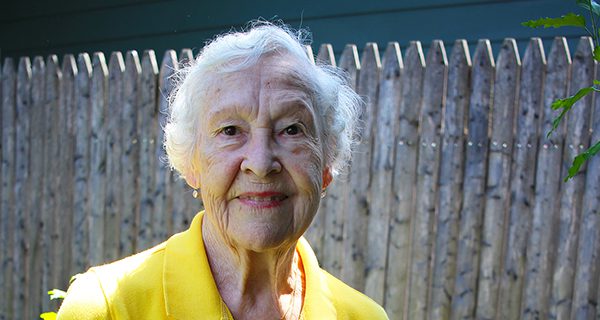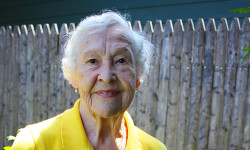[ccfic caption-text format="plaintext"]
By Geena Matuson
Hometown Weekly Staff
Concentration camp escapee. Cancer survivor. 50-year Police Matron and Police Traffic Supervisor. Wife, Mother and grandmother. This is just a glimpse into the life of Elisabeth Mann. Today, July 21, 2016, officially marks the first year Medfield celebrates Elisabeth T. Berlin Mann Day, declared one year ago today, upon her retirement. While many of us think we know ‘Mrs. Mann’ as the school crossing guard and wife to former Police Chief Bill Mann, Elisabeth has had a diverse history. While Hometown Weekly published an article about Elisabeth’s cello and a history of her father, today celebrates the woman behind the uniform.
Born in Germany in 1929, Elisabeth Mann was at the time Elisabeth Berlin, one of 11 children; seven sisters and three brothers. All family members played an instrument, and every Sunday they would hold family concerts. For her part, Elisabeth played the flute. Her father, Paul Karl Berlin, studied music at University of Berlin and favored the cello, also playing the tuba in The King’s Cavalry during World War I. However, as one World War moved into the next and Hitler took power, there was no more music. There were no operas, no symphonies. Her father’s studies and position as Lieutenant in the King’s Cavalry became almost obsolete, and he turned to banking to support his family.
While Elisabeth’s father was in Russia working for the bank in World War II, Elisabeth’s mother carried his beloved cello to and from the bomb shelter, sometimes two or three times in one night. This five-foot tall, 98-pound woman carried that cello on her back, also managing to save her sons’ piano. When the family home was hit with a firebomb and the top floors were set ablaze, her mother sawed off the legs of the piano and pushed it towards the front door. A postman was nearby and helped her mother carry the piano outside as this time an explosive bomb hit. The family cello has traveled quite a bit, finally landing in Elisabeth’s care, where it remains to this day.
Throughout the war, Elisabeth lost her home three times. Her family’s windows were filled with wood as glass continued to break, and it was not something you could purchase during wartime. As an older teenager in the early 1940s, Elisabeth went to live with her sister and three nephews in a different part of Germany. Then, in 1943, Elisabeth was taken to a concentration camp. She, her older sister and three nephews, were carted to a camp that they, like many other Germans, knew nothing about. Hitler persecuted Catholics and priests at the time, and concentration camps were kept just as quiet; only people living close to concentration camps understood what was going on at the time. There, Elisabeth and her relatives were guarded by a Jewish commanding officer named Müller who, one night, helped them to escape. She explained, “One night he told us, ‘I want you to get up tomorrow morning at 4 a.m. There’s a man who waits outside at 4 a.m., and he gets you to the border - but you must be there before 6 a.m.’ We knew the new guards were placed on duty at 6 a.m.” This was their chance.
The group met the man at 4 a.m. by a train viaduct, a large railroad bridge that runs some 100 feet above the water. The Russians controlled this half of the viaduct and had removed all wooden railroad planks, leaving just the two iron rails that comprised the bridge. First, Elisabeth’s sister and three nephews were helped along the metal rails, followed by the elderly. As a teenager, Elisabeth was the last to be helped along the path to safety. With no planks to walk across, they had to spread their bodies apart in order to hook their feet and hands into the metal rails, moving slowly down the viaduct. It was winter time, and Elisabeth recalls seeing the ice floats below. The Americans owned the other half of the tracks with wooden planks still in tact, allowing them a slightly safer passage once they reached the midpoint. Curious about her family’s capture and why they were sent to concentration camps, I asked Elisabeth about her religious affiliation at the time. She is still unsure, “My mother was protestant, and my father was Catholic…” However, when her grandchildren recently took a trip to Germany and looked into these records, they noticed that all other families with the surname ‘Berlin’ were Jewish. Elisabeth says she isn’t concerned either way - she is still alive.
In 1951, the family home was rebuilt, Elisabeth’s war-widowed sisters and family members returned home and went to work. Much like we read in ‘fantasy’ books such as ‘The Giver’ and ‘Divergent,’ the reality of post-war Germany forced every able bodied citizen to work in appointed positions without choice. Two of Elisabeth’s sisters were luckier than those forced into factories, instead working as the head secretary to the president of the largest electric company in Germany, AEG, and another working as a telephone operator due to her language skills.
Two of her brothers were in radio and worked for the station, performing part of ‘Children’s Hour’ broadcast each week. One brother, later a medic in the military, dreamt of going into broadcasting after the war “because he didn’t plan on getting killed,” she stated. Just nine days before the war ended, he was killed, his body only unearthed 50 years later when construction was starting up in East Germany and a mass grave was discovered. A photo of her brother’s grave hangs in her dining room today, where she lives with her husband, Former Medfield Police Chief William Mann.
Bill and Elisabeth met when she began life anew in post-war Germany. “I had no childhood. It stopped at age 10, and I didn’t live again until I was 21,” Elisabeth noted. At this time, a military troop from the United States was stationed near Stuttgart where the family lived. At the time, American soldiers were not supposed to be fraternizing with German girls; they were still considered the enemy. In order to maintain this directive, American soldiers had to wear their military uniforms at all times. However, Elisabeth’s sister worked for the US government and met many American soldiers. This led to Bill and Elisabeth’s meeting and eventual marriage. The family moved to Bill’s home in Medfield on July 20, 1954 with their 18-month-old daughter.
When Bill started out on the Medfield Police Force under Police Chief Allen Kingsbury, he told Elisabeth that the department was looking for young mothers with kids who could act as crossing guards. “The idea was that these young mothers could take their children to school, and go home with them at the end of the day. It was supposed to be just one hour in the morning, and one in the afternoon,” Elisabeth explained. What started as two-hours per day moved to four-hours, and Elisabeth became part of the police force herself. As a Police Matron, she was on call to handle female arrests, such as drunk and disorderlies, and breaking and entering. In this position, she would bring the women from their holding cells into court the next day, then remain until court officers arrived. In the beginning, Police Traffic Supervisors had uniforms - long skirts, or “horse blankets” as her colleagues joked, and nylons - even in the winter. After one year of this, Elisabeth and her female colleagues asked if they could wear pants and wool socks, and the request was granted.
Then, seven years ago, Elisabeth battled cancer - and won. Five surgeries after they said she wouldn’t live another year, here she is - a fighter and a survivor. Elisabeth spent 51 years with the police department and as a Police Traffic Supervisor, and had been working police detail up until just five years ago, well into her 80s. We spoke about her grandchildren, one receiving his Masters in Health Sciences, and another who was offered a great job straight out of college. Another held a 4.0 all throughout college, while another joined the military and was chosen for a special assignment, learning five languages in just three months prior to deployment.
She took me on a tour through her dining room and hall, pointing out all the different people from town ‘who knows this person who knows that person,’ going back over one hundred years. “There’s the embroidery my sisters and I did,” she pointed out at the top of the hallway, “and there’s my granddaughters at Spaghetti with Santa.” Now retired, Elisabeth finds even more time to attend all of the town’s many events, such as the recent Ribbon Cutting Ceremony at Straw Hat Park in the center of town, along with Legion Baseball games. She’s always a smiling face around town.
You can find Elisabeth Berlin Mann’s life story recorded and available on DVD through the Medfield High School Library, and with Medfield Historical Society.










